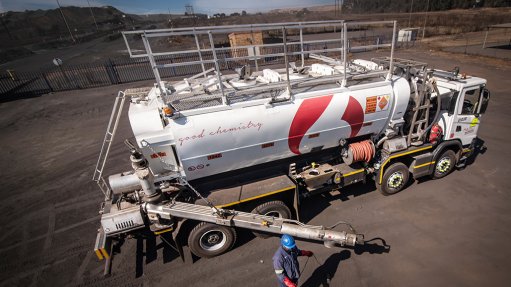Enzyme filtration gaining popularity
While enzyme and bacteria filtration products have separately been available to industries for natural filtration use, filtration company ZymeTech now offers a combined enzyme/bacteria solution to ensure a greener and more efficient approach to filtration, says ZymeTech MD Alan Badenhorst.
The company uses enzyme products as biological agents to remove or neutralise contaminants, such as the fats and oils in polluted water in industrial applications, through the use of grease traps in restaurants, hotels, conference centres and food courts, for example.
ZymeTech also supplies enzymes to break down organic matter in the septic tanks and wastewater treatment plants of households, guesthouses and resorts.
Traditional filtration methods, such as those found in septic tanks, leave a settlement of sludge, which needs to be disposed of, says Badenhorst, adding that enzymatic or bacterial treatments leave less settle- ment or residue than traditional filtration methods and by-products can, generally, be further cleaned or reused.
A common method of cleaning or empty- ing grease traps and septic tanks is to use a petrol- or diesel-driven machine that pumps out the waste and transports it to a hazardous-materials landfill, states ZymeTech operations director Ilan Zlotnick.
These machines waste irreplaceable natural resources and further pollute the environment through vehicle emissions. The landfills also take up valuable space.
By using an enzyme/bacteria filtration method, all of this is eliminated and the wastewater from septic tanks or grease traps can often be recycled, he points out.
“Enzymes are natural nonliving proteins that are secreted by all living beings and organisms and serve various catalytic purposes for biochemical reaction,” Badenhorst explains.
They are used in many industries to perform various functions, such as stonewashing jeans instead of using bleach and stones, or defluffing cotton garments, enabling a silkier, longer- lasting surface.
“Enzymes not only replace chemicals but also reduce the consumption of raw materials, energy and water, benefiting the environment and industry,” Zlotnick notes.
The process of ensuring the correct formulation of enzyme and bacteria for industrial filtration use is complex, Badenhorst points out.
“Our principal, Realco, in Belgium, produces various strains of enzymes and different bacteria. These products are then formulated and stabilised at Realco’s laboratories. The finished products are each designed to react and break down different types of organic waste matter, such as waste in grease traps or septic tanks.
“Enzymes act as natural filters to contaminants and, through the filtration process, naturally break down organic contaminants. Our products break particles down into smaller bits, allowing the bacteria to consume them.”
He stresses that the sole use of enzyme products is to break down sludge, but the effluent will still contain small sludge particles that clog drains and contribute to waste matter.
In addition, the sole use of bacteria will not provide sufficient time for particle elimination, as it will not be active for long enough to eliminate sludge particles, which first need to be broken down by the enzyme treatment.
“The enzyme/bacteria products we recommend for septic tanks and wastewater treatment plants contain a specially formulated broad spectrum of bacteria and enzymes that would be required to break down various forms of waste,” Zlotnick states.
Product Offering
ZymeTech sells three main products for industrial filtra- tion applications.
“These products break down macromolecules, transforming them into microparticles that are easily digested by purification bacteria.
Enzyfood is a pure enzyme primarily used for plumbing applications such as the cleaning of pipes. The enzymes rely on the bacteria that naturally occur in the pipes and break down the waste; the bacteria then feeds off the simplified matter, converting it into natural elements, such as oxygen and carbons.
ZymeTech also offers CPL50 – a product comprising enzymes mixed with specific strains of bacteria that are commonly used for septic tank cleaning and are designed to break down sewage.
“Instead of relying on natural bacteria, ZymeTech ensures users receive the correct bacteria in a packaged bottle,” Badenhorst notes.
The company also supplies CPL70 – a product similar to CPL50, but specifically designed for grease traps and the treatment of fats, oils and grease.
“The results achieved with these products are effective and customer satisfaction is high. In addition, the products are environment-friendly,” Zlotnick states.
ZymeTech’s products are all biodegradable and leftover bacteria die naturally in the absence of enzymes.
“All products have a positive impact on the environment, as they are decontaminants and, therefore, break down pollution. They also help effluent purification by boosting the natural purification process of organic materials,” he notes.
Water Filtration
Further, ZymeTech says it can also assist in the filtration of water. Water pollution is a global problem, especially in Africa, where many rural communities do not have drinkable water.
Drinking unsafe water can pose many problems, such as diarrhoea, guardia, salmonella, cholera, typhoid, E. coli and other faecal coli forms.
The company’s Aquadrop copper-iron solution is suitable for use by rural communities and hikers and campers to ensure immediate water filtration for consumption.
“It is a solution that ensures the quick treatment of water to make it safe for consumption. Aquadrop does not contain harmful or dangerous chemicals and can also be used for industrial purposes,” says Badenhorst.
While the solution has previously not been available in South Africa, ZymeTech states that it has now introduced this product to the local market.
Badenhorst notes that there is significant interest in enzyme/bacteria filtration solutions among industries worldwide. “In South Africa, particularly, we are noticing that clients are considering these types of solutions, as they realise their responsibility towards the environment and want to help promote and embrace change to a greener lifestyle.”
Research and Development
ZymeTech points out that Realco conducts research and develops enzymatic solutions mainly for the cleaning industry.
Realco is involved in the formulation of detergents for the surface and circuit cleaning at food production factories and has recently introduced a product onto the market that breaks down biofilm – a collection of bacteria encased in an extracellular polymeric substance, commonly known as slime.
“The product is an enzymatic solution and has generated much interest from the European market. The product is not yet available in South Africa,” Zlotnick notes.
Periodically using enzymatic detergents in food production areas enables clients, such as ready-meal producers, meat processing factories, abattoirs and poultry abattoirs, to reach higher levels of hygiene by reduc- ing surface contamination.
“Higher hygiene levels in the production environment means a better quality final product. In some cases, using enzyme detergents has enabled an increase of up to 50% in product shelf life,” Badenhorst concludes.
Article Enquiry
Email Article
Save Article
Feedback
To advertise email advertising@creamermedia.co.za or click here
Press Office
Announcements
What's On
Subscribe to improve your user experience...
Option 1 (equivalent of R125 a month):
Receive a weekly copy of Creamer Media's Engineering News & Mining Weekly magazine
(print copy for those in South Africa and e-magazine for those outside of South Africa)
Receive daily email newsletters
Access to full search results
Access archive of magazine back copies
Access to Projects in Progress
Access to ONE Research Report of your choice in PDF format
Option 2 (equivalent of R375 a month):
All benefits from Option 1
PLUS
Access to Creamer Media's Research Channel Africa for ALL Research Reports, in PDF format, on various industrial and mining sectors
including Electricity; Water; Energy Transition; Hydrogen; Roads, Rail and Ports; Coal; Gold; Platinum; Battery Metals; etc.
Already a subscriber?
Forgotten your password?
Receive weekly copy of Creamer Media's Engineering News & Mining Weekly magazine (print copy for those in South Africa and e-magazine for those outside of South Africa)
➕
Recieve daily email newsletters
➕
Access to full search results
➕
Access archive of magazine back copies
➕
Access to Projects in Progress
➕
Access to ONE Research Report of your choice in PDF format
RESEARCH CHANNEL AFRICA
R4500 (equivalent of R375 a month)
SUBSCRIBEAll benefits from Option 1
➕
Access to Creamer Media's Research Channel Africa for ALL Research Reports on various industrial and mining sectors, in PDF format, including on:
Electricity
➕
Water
➕
Energy Transition
➕
Hydrogen
➕
Roads, Rail and Ports
➕
Coal
➕
Gold
➕
Platinum
➕
Battery Metals
➕
etc.
Receive all benefits from Option 1 or Option 2 delivered to numerous people at your company
➕
Multiple User names and Passwords for simultaneous log-ins
➕
Intranet integration access to all in your organisation


















